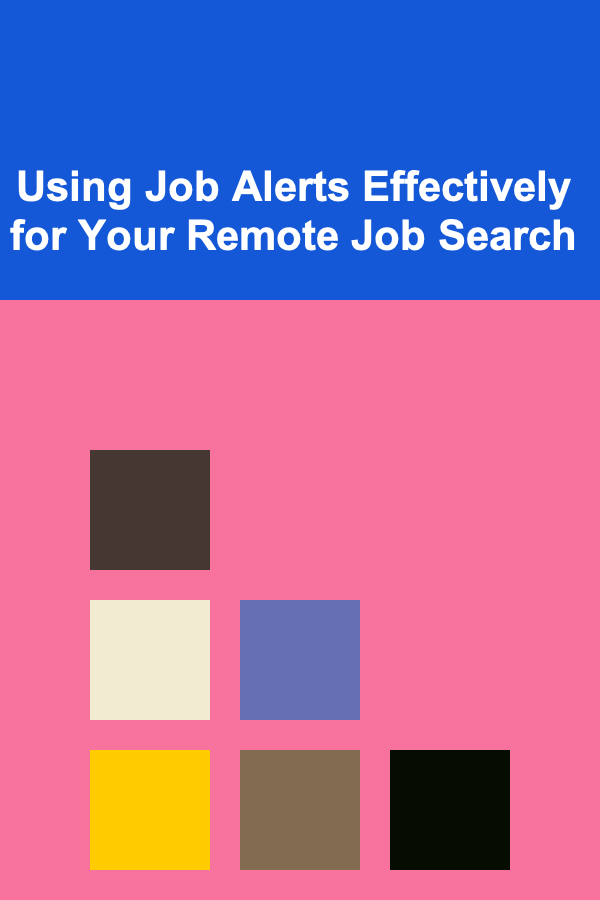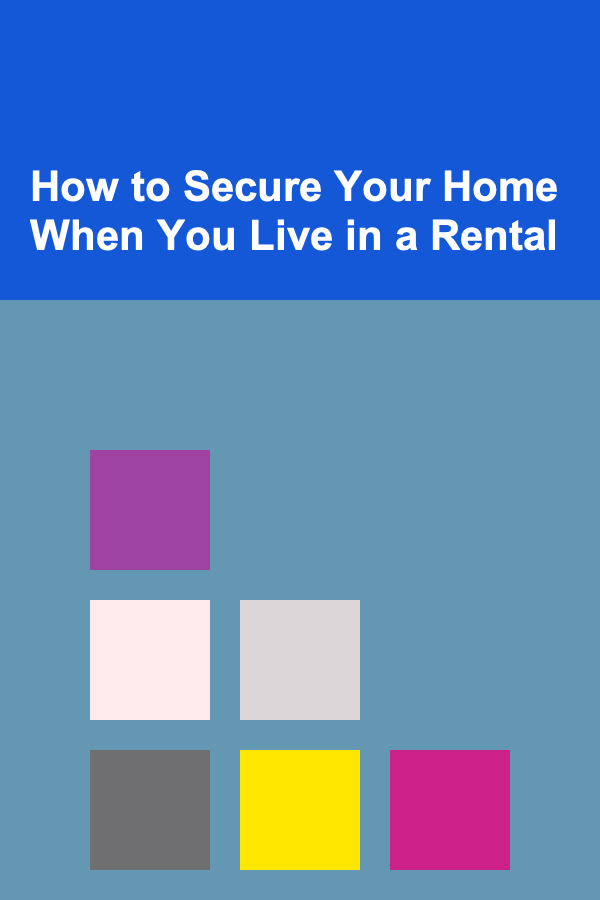
Using Job Alerts Effectively for Your Remote Job Search
ebook include PDF & Audio bundle (Micro Guide)
$12.99$10.99
Limited Time Offer! Order within the next:

The rise of remote work has created exciting opportunities for professionals looking to balance flexibility with career growth. However, in a sea of online job boards and hundreds of available listings, navigating your remote job search can feel overwhelming. This is where job alerts come into play. When used effectively, job alerts can streamline your search process, ensuring you never miss an opportunity while saving you valuable time.
Job alerts are notifications set up through job boards or employer websites that automatically notify you when relevant job openings are posted. By refining your use of job alerts, you can tailor your remote job search to be more efficient, relevant, and effective.
This guide will take a deep dive into how to use job alerts to enhance your remote job search, covering best practices, customization tips, and tools that will make the most out of your job-hunting experience.
Why Job Alerts are Essential for Remote Job Seekers
Job alerts are a game-changer for remote job seekers. Here's why:
- Time Efficiency: Instead of manually searching for remote jobs each day, job alerts send relevant listings directly to your inbox or phone, allowing you to focus on other parts of your job search.
- Stay Ahead of the Competition: Remote jobs can be competitive, with companies receiving hundreds of applications within hours of posting. Job alerts give you a competitive edge by notifying you as soon as a job is posted, allowing you to apply early.
- Customization: Job alerts can be highly customized to match your skills, preferences, and career goals, ensuring that the roles you are notified about are a good fit.
- Consistency: Regular job alerts keep you consistent in your search. This ensures that even if you get busy with other responsibilities, you stay updated on new opportunities.
Choosing the Right Platforms for Job Alerts
To maximize the effectiveness of job alerts, you need to set them up on the right platforms. Remote job boards are the best place to start, but not all job boards are created equal. Here are some key platforms that specialize in remote job listings:
Top Platforms for Remote Job Alerts:
- FlexJobs: This platform focuses on flexible, remote, and part-time jobs. Setting up job alerts here allows you to filter opportunities by job type, career level, and location preferences.
- We Work Remotely: One of the largest remote job boards, We Work Remotely allows you to sign up for alerts based on your field of expertise and role preferences.
- Remote.co: This platform provides a mix of remote roles across a variety of industries. You can set up job alerts to receive notifications based on your search criteria.
- AngelList: If you're interested in startups, AngelList is a great choice for remote job alerts. You can filter roles by job type, experience level, and preferred salary.
- LinkedIn: While LinkedIn is primarily a professional networking site, it also offers job search and alert features. By refining your job alert settings, you can receive notifications for remote opportunities that match your profile.
Each of these platforms offers tailored job alerts based on specific keywords, industries, and job types. By using these platforms, you can ensure that you are alerted to the most relevant job openings for your remote job search.
Refining Your Job Alerts for Precision
Setting up job alerts is just the beginning. To truly take advantage of these alerts, it's crucial to fine-tune them to match your career aspirations. Here's how you can refine your job alerts to get the best results:
Focus on Specific Keywords
One of the main reasons job alerts are so effective is that you can customize them to notify you about specific roles. Start by choosing the right keywords. For example:
- Remote Marketing Manager
- Virtual Assistant
- Work-from-home Software Engineer
- Telecommute Data Analyst
These keywords ensure you are alerted only about jobs that match your skills and interests. Avoid generic terms like "remote" alone---this can lead to a broad range of jobs that might not align with your expertise.
Filter by Job Type
Different job boards offer various types of remote work, from part-time and freelance roles to full-time positions. You can filter your job alerts to match your preferred work schedule. Consider the following:
- Full-time remote
- Part-time remote
- Freelance remote
- Contract remote
These filters will help you receive job alerts only for the positions you are most interested in, avoiding job overload from irrelevant listings.
Narrow Down by Industry or Role
If you have a specific industry or role in mind, make sure your job alerts reflect this. For example, if you are looking for remote jobs in marketing, you can set up alerts specifically for "remote marketing roles" or more specific terms like "digital marketing remote."
This customization will ensure that you don't waste time reviewing roles that don't align with your career goals.
Set Location Preferences
While you are focused on remote work, you may have preferences for specific regions, especially if the company has timezone requirements or if you prefer to work with companies in your country. Many job boards allow you to set location preferences even for remote jobs. This is particularly helpful if you want to avoid international roles that require working in inconvenient time zones.
Frequency and Timing of Job Alerts
When setting up job alerts, be mindful of how often you receive them. The frequency of job alert emails can affect how well you manage your job search.
Email Frequency: How Often Should You Get Alerts?
Most job boards allow you to choose the frequency of job alerts. The options typically range from immediate alerts to daily or weekly summaries. Consider your needs and how active your search is:
- Immediate Alerts: Best if you want to apply as soon as a job is posted and don't mind receiving frequent notifications. This can be especially helpful for highly competitive roles.
- Daily Alerts: Ideal for job seekers who prefer to digest all new opportunities at once without being overwhelmed by constant email updates.
- Weekly Alerts: Best for those who want a more laid-back approach and don't mind waiting for a summary of new job listings.
It's important to strike a balance between being notified promptly and avoiding email fatigue. Overloading your inbox with notifications can be distracting and time-consuming, so find the right timing for your job alert preferences.
Managing Multiple Job Alerts Efficiently
If you're applying for multiple types of roles (e.g., remote marketing, project management, content writing), you may end up with multiple job alerts across different platforms. Managing these alerts effectively will help you stay organized and prevent missed opportunities.
Consolidating Alerts:
Some job boards allow you to consolidate job alerts across various categories into a single email digest, making it easier to keep track of opportunities without feeling overwhelmed.
Organizing Alerts by Priority:
If you have several active alerts set up, consider organizing them by priority. For instance:
- High Priority: Alerts for jobs that are an exact match for your experience and career goals.
- Medium Priority: Alerts for jobs that are close but might require more effort to tailor your resume or apply for.
- Low Priority: Alerts for roles you are considering as backup options or those that aren't quite a perfect fit.
This system will help you focus your energy on the most relevant opportunities.
Tailoring Your Application Process
Once job alerts start pouring in, the next challenge is efficiently applying to roles. Here are some ways to streamline your application process:
Automate Your Resume Customization
For each job alert you receive, take the time to tailor your resume and cover letter to the job description. This increases your chances of standing out, but it can be time-consuming. To save time:
- Use tools like Jobscan to compare your resume against the job description and make sure your resume is optimized for applicant tracking systems (ATS).
- Store a variety of resume templates tailored to different types of roles. This way, you can quickly adjust your resume for each new opportunity.
Track Your Applications
Use a spreadsheet or job search management tool to track the jobs you've applied for. Include columns for:
- Job title
- Date of application
- Status (e.g., application submitted, awaiting response)
- Follow-up date
Tracking your job applications will help you stay organized and prevent you from applying to the same job multiple times.
Be Prepared to Act Quickly
Remote jobs, especially those that offer flexible or desirable work conditions, can fill up fast. This is why job alerts are such a powerful tool---they give you a head start. However, it's essential to act quickly upon receiving a job alert.
When you receive a job alert:
- Review the listing immediately: Assess whether the job aligns with your skills and career goals. If it's a good fit, apply as soon as possible.
- Set aside time for applications: Allocate specific time blocks during your week to focus solely on job applications. This helps you stay consistent and focused without distractions.
Refining and Updating Alerts Over Time
As your remote job search evolves, you may need to adjust your job alerts. If you're finding that you're receiving too many irrelevant job listings, refine your keywords or filters. On the other hand, if your search is too narrow, expand your criteria to uncover more opportunities.
Adjust Frequency and Criteria:
As you progress, you might find that you need more or fewer alerts, or that your preferences shift. Don't hesitate to update your alerts regularly to match your evolving career goals.
Conclusion
Job alerts are an essential tool for remote job seekers, offering a time-saving, customizable way to stay updated on relevant job opportunities. By choosing the right platforms, refining your alert settings, and managing multiple alerts effectively, you can significantly enhance your remote job search experience. Be proactive, stay organized, and use job alerts strategically to secure the remote role that best fits your career aspirations and lifestyle.

How to Create a Cozy Atmosphere for an Indoor Winter Party
Read More
How to Network Effectively in a Remote Work Environment
Read More
How to Secure Your Home When You Live in a Rental
Read More
How to Share Antique Knowledge with the Next Generation
Read More
How to Use Aromatherapy and Candles to Enhance Your Holiday Home Decor
Read More
How to Bake for a Crowd
Read MoreOther Products

How to Create a Cozy Atmosphere for an Indoor Winter Party
Read More
How to Network Effectively in a Remote Work Environment
Read More
How to Secure Your Home When You Live in a Rental
Read More
How to Share Antique Knowledge with the Next Generation
Read More
How to Use Aromatherapy and Candles to Enhance Your Holiday Home Decor
Read More